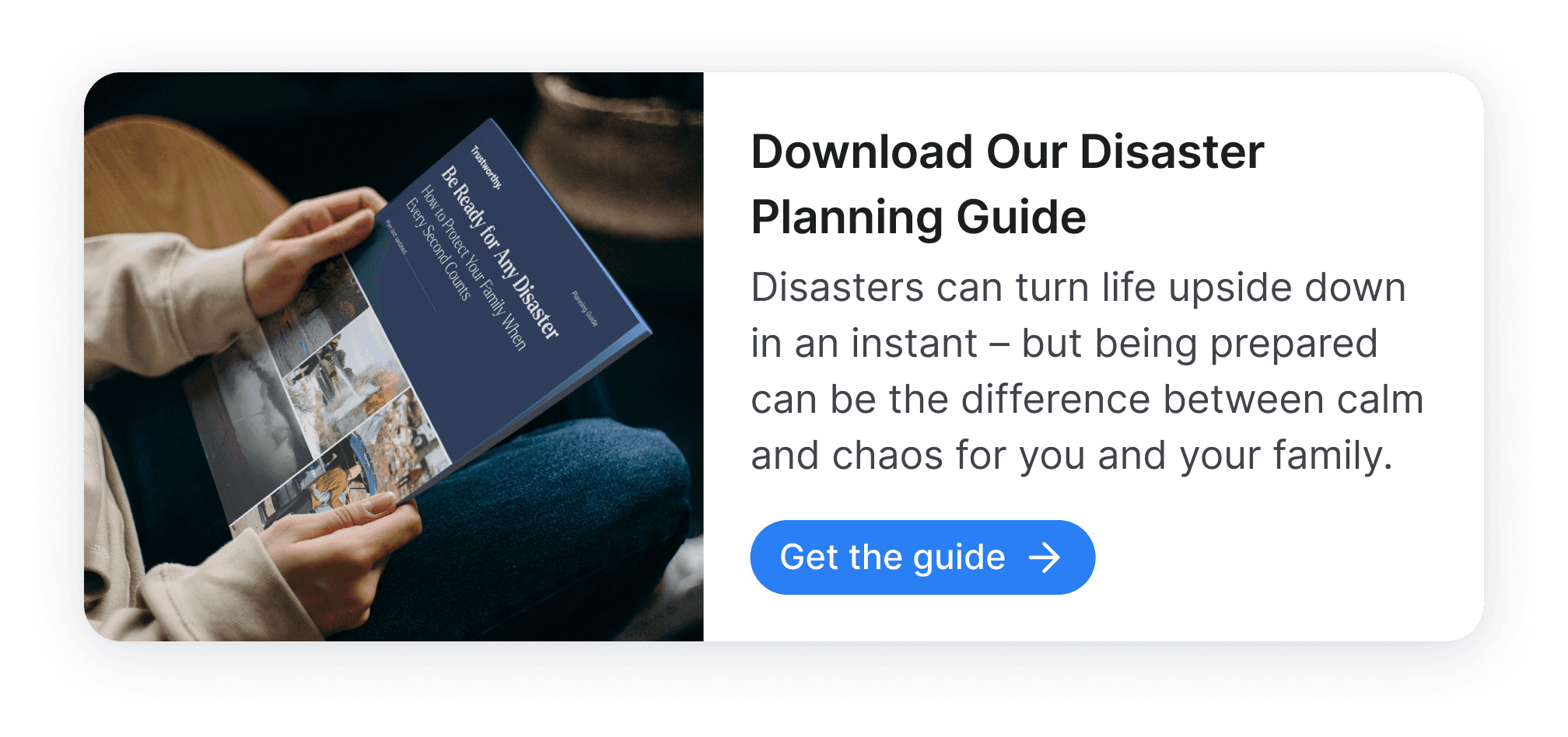
Key Takeaways
Natural disasters bring unexpected costs from temporary lodging to emergency repairs, and insurance companies, mortgage lenders, and relief agencies all require documentation to process claims or provide aid.
Critical financial documents include insurance policies (home/auto/health/life), mortgage or rental agreements and proof of residence, bank and retirement account information, recent tax returns required by many aid programs, and estate planning documents.
Paper copies can be destroyed by fire, flood, or wind, and even fireproof safes may not protect against prolonged exposure, while a hybrid approach maintains physical copies in secure, portable binders backed up digitally.
Trustworthy's Family Operating System® allows families to store financial records safely, encrypt sensitive details, organize files for simple retrieval, and grant specific permissions so trusted family members or advisors can access only what they need.
Without ready access to financial documents, recovery is delayed and families may miss out on benefits they're entitled to, while digital storage provides flexibility allowing retrieval from any location during displacement.

Natural disasters often bring to mind evacuation kits, bottled water, and emergency flashlights. Yet one of the most overlooked areas of disaster preparedness is financial readiness.
When a storm, wildfire, or earthquake disrupts your life, your ability to recover often depends on whether you can access critical financial documents quickly.
This article explores how families can safeguard financial records, the kinds of documents to prioritize, and how digital tools can make recovery far easier.

Why Financial Preparedness Matters
Q: Why should families think about finances in disaster planning?
A: Natural disasters can halt normal life in an instant. Beyond the immediate safety risks, families often face unexpected costs — from temporary lodging to emergency repairs. Insurance companies, mortgage lenders, and relief agencies all require documentation to process claims or provide aid.
Without ready access to those documents, recovery is delayed, and families may even miss out on benefits they’re entitled to.

Q: What are the most important financial documents to protect?
A: At minimum, you’ll need:
Insurance policies (home, auto, health, life).
Mortgage or rental agreements and proof of residence.
Bank and retirement account information.
Recent tax returns, which many aid programs require.
Estate planning documents such as wills, trusts, and financial powers of attorney.
Think of anything you would need to prove ownership, identity, or financial responsibility in the days after a disaster.
Building a Financial Safety Net
Q: Is keeping paper copies enough?
A: Paper copies can help but are often insufficient. They can be destroyed by fire, flood, or wind.
Even so-called fireproof safes may not protect against prolonged exposure. A hybrid approach can work, however: You can maintain physical copies of the most essential documents in a secure, portable binder, but back them up digitally as well.
Q: How can digital storage strengthen financial preparedness?
A: When stored securely, digital documents provide families with flexibility. If you’re displaced to another city or country, you can still retrieve your documents online. That’s where a secure digital vault comes in.

A digital vault like Trustworthy’s Family Operating System® allows families to store financial records safely, encrypt sensitive details, and organize files in ways that make retrieval simple. Instead of sifting through piles of papers in a chaotic moment, families can log in and find what they need instantly.
Q: Who should have access to these financial documents?
A: Trusted family members or advisors should be able to access certain records if you’re unavailable.
For example, a spouse may need mortgage documents, or an adult child may need access to your insurance files to help with claims. Digital platforms let you grant specific permissions, so each person sees only what they need.
Practical Steps for Families
Q: How can families start preparing today?
A: A few concrete steps can make all the difference:
Make a document inventory. List every financial document you have and where it’s stored.
Digitize important papers. Scan or photograph documents and save them securely. Trustworthy's mobile app includes a built-in document scanner.
Use organized storage. Categorize files by type — insurance, banking, taxes, estate planning.
Review access permissions. Ensure family members know how to retrieve documents in an emergency.

Q: What about identity protection during disasters?
A: Disaster zones often become hotspots for identity theft. When families rely on unsecured emails or USB drives to transfer sensitive documents, they expose themselves to unnecessary risk.
A secure, encrypted system like Trustworthy reduces that risk while still giving you fast access. Trustworthy's SecureLinks™ feature lets you privately share sensitive files while controlling who can access them and for how long.
Q: How does preparedness reduce emotional stress?
A: Financial worries can magnify the trauma of a natural disaster. Families who have organized their records ahead of time experience less anxiety during recovery.
They can file insurance claims more quickly, avoid disputes over bills, and focus on physical and emotional safety.
The Bottom Line
Natural disasters test families in every possible way — physically, emotionally, and financially. By organizing and safeguarding financial records in advance, you create a foundation for quicker recovery and greater peace of mind.
Paper binders can only go so far. A secure digital vault such as Trustworthy helps families protect their financial lifelines with encryption, tokenization, organized storage, and controlled access. When disaster strikes, being able to retrieve those documents easily isn’t just convenient — it can make the difference between a smooth recovery and prolonged hardship.
We’d love to hear from you! Feel free to email us with any questions, comments, or suggestions for future article topics.













